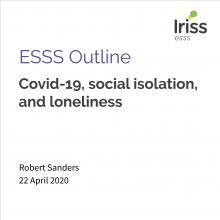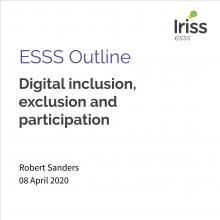Scotland is facing an ageing population demographic and the implications have been widely discussed: the size of the available workforce; pressure on pensions; and how health and social care will support more individuals with emerging long term conditions. These implications coupled with a desire for public services to be more flexible and personalised to individuals, has led some local authorities to fundamentally redesign their approach to service delivery.
In North Lanarkshire, the Older Adults department have set up a network of six locality support officers to lead on services that meet the needs and interests of the individual service user. The officers work across local authority departments and are embedded in the local community to focus on rehabilitation and re-enablement of older people into communities.
Individuals do not see a separation between visiting their GP, having home help, and accessing day activities but unfortunately local authorities funding streams and departments means that these services are rarely integrated and individuals must consult with all to access services that meet their complex needs and provide them with the outcome they want. Increasing financial pressures on public services to keep costs down should encourage services to work together but few local authorities have the infrastructure to make this happen.
Out of a crisis comes a new way of thinking
Five years ago in North Lanarkshire, Locality Link Officers were proposed in response toa crisis of day care centres that were full. This triggered the department into thinking how they could do things differently bringing different departments together, what kind of services they offered, what kind of outcomes people really wanted and overcome the crisis.
The idea was driven forward by the Head of Older Adults at the Council. Initially they trialled the officers in one area with service users before rolling out the successful across the whole of the council's jurisdiction. There wasn't a model for the approach, although it draws on community development to recognize that people often need support connecting into what activities and options are available.
Supporting individuals to find ways of improving their quality of life
The Locality Link Officers are based across the six localities in North Lanarkshire and are supported by the head team at the Council's Motherwell offices. Their remit is to connect into a variety of community activities and potential opportunities for hobbies, and they are responsible for service users' day activities. The Officers have a budget and the approach places emphasis on spending money on activities the individual wants to do, rather than spending money on the person.
Fortnightly, multidisciplinary locality planning meetings are held with staff with pre-existing specialisms, including: community nurses, manager of integrated services, senior social worker, day hospital senior occupational therapist and assessors to discuss service users. All departments can bring cases of service users for discussion. The Locality Link Officer's role is connect service users with activities and hobbies, and if they don't already exist in the community to set up a new service. The Officers have a budget to set up activities, such as a fishing group, to help meet the desired outcomes.
Encouraging community engagement and involvement
Locality link officers start up groups for service users and create starter packs, whilst engaging the communities and individuals in managing activities into the future. Officers' roles are to facilitate new groups that are sustainable and in which there is genuine interest, with service users managing their groups into the future. Officers often will run taster days - such as a recent Japanese arts and crafts day - so service users can try activities before groups are developed and launched. The role of the Officer is to facilitate local social innovation rather than prescriptively provide possible hobbies, thereby creating a user generated service.
The idea has been incredibly successful at providing outcomes that users want and blurring public sector and community boundaries. Service users develop new friendships and tie with their community as result, and are mentally and physically stimulated by the activities they are involved in - while in themselves contributing to a more cohesive community.
Taking the idea forward, other innovative projects - such as new intergenerational projects that include older adults and young people - are delivered through the officers. Furthermore in the last year the scheme has been expanded with the introduction of Locality Support Officers, whose role is support the Locality Link Officers as they work across boundaries.
For further information contact North Lanarkshire Council




